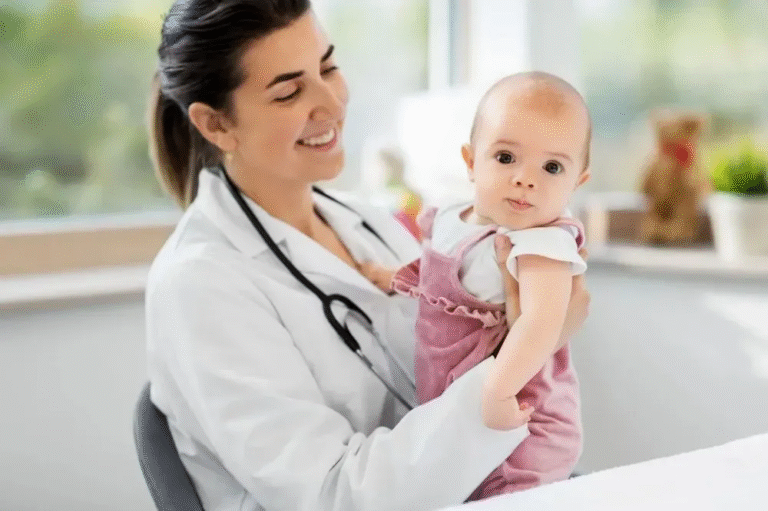What to Expect During a Child’s First Pediatric Visit
Bringing your baby to the pediatrician for the first time is a big step in your parenting journey. Whether you’re a first-time parent or have been through this before, that very first appointment sets the tone for your child’s future healthcare experience. It’s normal to feel both excited and a little nervous.
This guide will walk you through what to expect during a child’s first pediatric visit, what questions you can ask, and how you can prepare to make the experience smooth and reassuring for you and your baby.
Why the First Pediatric Visit Is Important
The first visit to the pediatrician usually happens within a few days of bringing your newborn home from the hospital—often between 3 to 5 days after birth. This check-up plays a vital role in:
- Checking your baby’s early health and development
- Creating a healthcare plan
- Building a relationship with your pediatrician
- Answering all your parenting questions
The pediatrician becomes a long-term health partner for your child, so this visit helps to establish trust and comfort for both you and your baby.
How to Prepare for the First Visit
Here are some simple tips to help you get ready:
- Schedule the appointment in advance. Try to pick a time when your baby is usually calm.
- Write down any questions or concerns. Sleep patterns, feeding issues, diapering, or anything else.
- Bring important items:
- Your baby’s hospital discharge papers
- Any vaccination records
- Insurance card
- Diapers, wipes, extra clothes, bottles if formula-feeding
- Your baby’s hospital discharge papers
- Dress your baby in easy-to-remove clothing. The doctor will need to check your baby’s whole body.
The more prepared you are, the smoother the visit will go.
What Happens During the Visit?
A first pediatric visit typically takes around 30–60 minutes and covers a variety of checks and discussions. Let’s break it down step by step.
1. Initial Measurements
The pediatric nurse or doctor will take a few key measurements:
- Weight: To track growth since birth.
- Length: Measuring from head to toe.
- Head circumference: To monitor brain and skull development.
These measurements are compared to growth charts to make sure your baby is on track.
2. Physical Examination
The pediatrician will do a full physical exam. This includes checking:
- Skin (for rashes or jaundice)
- Eyes, ears, nose, and mouth
- Heart and lungs (listening for irregularities)
- Abdomen (feeling for any unusual masses)
- Genitals and hips
- Reflexes (like the startle reflex)
It might seem like a lot, but it’s all gentle and done with care.
3. Feeding and Sleeping Discussion
One of the biggest topics during the first visit is feeding. Whether you are breastfeeding or formula feeding, the pediatrician will want to know:
- How often your baby feeds
- How much they’re eating
- If there are any difficulties (like latching issues)
Sleep is also a common concern for new parents. Expect questions about:
- How long your baby sleeps at a time
- Day and night patterns
- Any trouble settling your baby
4. Umbilical Cord and Circumcision Check (If Applicable)
If the umbilical cord stump hasn’t fallen off yet, the doctor will check for signs of infection and give tips on care. If your baby is circumcised, the doctor will check the healing process and offer any additional guidance.
5. Vaccinations and Screening
Most babies won’t get many shots at this visit, especially if they received the Hepatitis B vaccine at the hospital. However, the pediatrician will go over the immunization schedule and may perform:
- Newborn screening test review (done at birth)
- Jaundice assessment (common in the early days)
- Hearing test review, if not already completed
6. Your Questions and Concerns
You’re encouraged to ask anything—no question is too small. Newborn care can feel overwhelming, so take this time to get professional answers. Common questions include:
- How do I know if my baby is getting enough milk?
- What’s normal when it comes to poop and pee?
- How can I soothe my baby when they cry?
- When should I start tummy time?
- Is my baby’s sleep pattern normal?
Tips for a Smooth Visit
Here are some parent-tested suggestions to make the day easier:
- Arrive early to fill out paperwork.
- Bring a feeding before or after the appointment to keep your baby content.
- Use a car seat carrier so your hands are free.
- Bring a loved one with you if possible—it helps to have support.
- Keep calm. Your baby will pick up on your energy. Even if they cry, pediatricians are used to it.
What Happens After the Visit?
The doctor will tell you:
- When to come back (usually in 2–4 weeks)
- What changes to watch for
- How your baby is doing overall
You may receive handouts or digital guides about newborn care. Make sure to store this information somewhere you can easily find it.
When to Call the Pediatrician Between Visits
Even though you have a follow-up scheduled, call the pediatrician if you notice:
- A high fever (above 100.4°F in babies under 3 months)
- Difficulty feeding or refusing food
- Extreme sleepiness or lethargy
- Trouble breathing
- Fewer wet diapers (a sign of dehydration)
Your baby’s health can change quickly, so don’t hesitate to reach out.
Conclusion
The first pediatric visit is more than a medical check-up—it’s the start of your baby’s health journey and your relationship with your pediatrician. Expect a thorough examination, lots of questions, and helpful guidance. Don’t worry if your baby cries or fusses; that’s perfectly normal.
Remember, this visit is also about you. You’ll leave the office feeling more confident and supported as a parent. Bring your concerns, take notes, and trust that you’re doing a great job.
FAQs About a Child’s First Pediatric Visit
1. When should my baby have their first pediatric visit?
Typically, 3–5 days after birth or within the first week. Your hospital may help schedule it before discharge.
2. What should I bring to the appointment?
Bring hospital discharge papers, any available vaccination records, insurance card, extra diapers and clothes, and feeding supplies if needed.
3. How long does the first visit take?
Around 30–60 minutes, depending on questions, examinations, and your baby’s condition.
4. Will my baby get shots during this visit?
Not always. If your baby didn’t get the Hepatitis B vaccine at the hospital, it may be given during this visit.
5. Is it okay if my baby cries a lot during the visit?
Absolutely. It’s normal for newborns to cry, especially during undressing or exams. Pediatricians are used to it and will be gentle and understanding.



